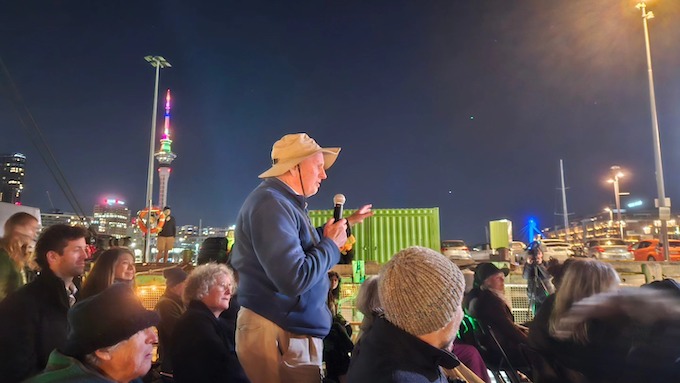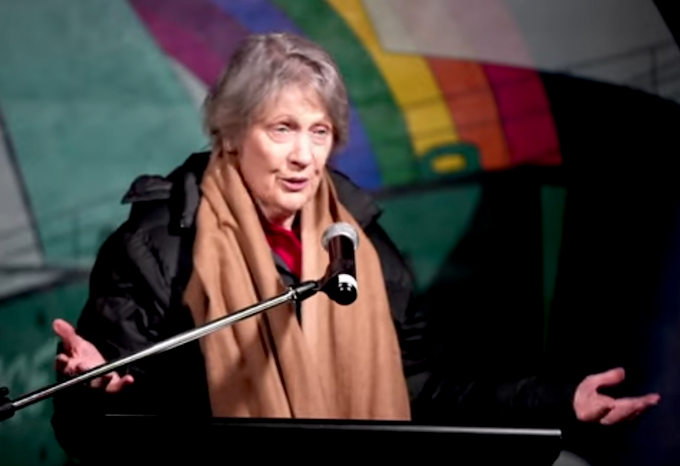
Asia Pacific Report
Former New Zealand prime minister Helen Clark warned activists and campaigners in a speech on the deck of the Greenpeace environmental flagship Rainbow Warrior III last night to be wary of global “storm clouds” and the renewed existential threat of nuclear weapons.
Speaking on her reflections on four decades after the bombing of the original Rainbow Warrior on 10 July 1985, she said that New Zealand had a lot to be proud of but the world was now in a “precarious” state.
Clark praised Greenpeace over its long struggle, challenging the global campaigners to keep up the fight for a nuclear-free Pacific.
- READ MORE: ‘Storm clouds are gathering’: 40 years on from the bombing of the Rainbow Warrior
- Operation Exodus: The Rainbow Warrior’s last Pacific mission
- Other Rainbow Warrior reports
“For New Zealand, having been proudly nuclear-free since the mid-1980s, life has got a lot more complicated for us as well, and I have done a lot of campaigning against New Zealand signing up to any aspect of the AUKUS arrangement because it seems to me that being associated with any agreement that supplies nuclear ship technology to Australia is more or less encouraging the development of nuclear threats in the South Pacific,” she said.
“While I am not suggesting that Australians are about to put nuclear weapons on them, we know that others do. This is not the Pacific that we want.
“It is not the Pacific that we fought for going back all those years.
“So we need to be very concerned about these storm clouds gathering.”
Lessons for humanity
Clark was prime minister 1999-2008 and served as a minister in David Lange’s Labour government that passed New Zealand’s nuclear-free legislation in 1987 – two years after the Rainbow Warrior bombing by French secret agents.
She was also head of the United Nations Development Programme (UNDP) in 2009-2017.
“When you think 40 years on, humanity might have learned some lessons. But it seems we have to repeat the lessons over and over again, or we will be dragged on the path of re-engagement with those who use nuclear weapons as their ultimate defence,” Clark told the Greenpeace activists, crew and guests.
“Forty years on, we look back with a lot of pride, actually, at how New Zealand responded to the bombing of the Rainbow Warrior. We stood up with the passage of the nuclear-free legislation in 1987, we stood up with a lot of things.
“All of this is under threat; the international scene now is quite precarious with respect to nuclear weapons. This is an existential threat.”
Nuclear-free Pacific reflections with Helen Clark Video: Greenpeace
In response to Tahitian researcher and advocate Ena Manuireva who spoke earlier about the legacy of a health crisis as a result of 30 years of French nuclear tests at Moruroa and Fangataufa, she recalled her own thoughts.
“It reminds us of why we were so motivated to fight for a nuclear-free Pacific because we remember the history of what happened in French Polynesia, in the Marshall Islands, in the South Australian desert, at Maralinga, to the New Zealand servicemen who were sent up in the navy ships, the Rotoiti and the Pukaki, in the late 1950s, to stand on deck while the British exploded their bombs [at Christmas Island in what is today Kiribati].
“These poor guys were still seeking compensation when I was PM with the illnesses you [Ena] described in French Polynesia.
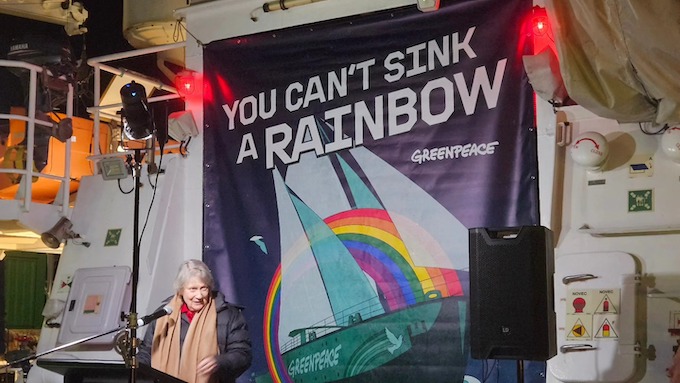
Testing ground for ‘others’
“So the Pacific was a testing ground for ‘others’ far away and I remember one of the slogans in the 1970s and 1980s was ‘if it is so safe, test them in France’. Right? It wasn’t so safe.
“Mind you, they regarded French Polynesia as France.
“David Robie asked me to write the foreword to the new edition of his book, Eyes of Fire: The Last Voyage and Legacy of the Rainbow Warrior, and it brought back so many memories of those times because those of you who are my age will remember that the 1980s were the peak of the Cold War.
“We had the Reagan administration [in the US] that was actively preparing for war. It was a terrifying time. It was before the demise of the Soviet Union. And nuclear testing was just part of that big picture where people were preparing for war.
“I think that the wonderful development in New Zealand was that people knew enough to know that we didn’t want to be defended by nuclear weapons because that was not mutually assured survival — it was mutually assured destruction.”
New Zealand took a stand, Clark said, but taking that stand led to the attack on the Rainbow Warrior in Auckland harbour by French state-backed terrorism where tragically Greenpeace photographer Fernando Pereira lost his life.
“I remember I was on my way to Nairobi for a conference for women, and I was in Zimbabwe, when the news came through about the bombing of a boat in Auckland harbour.
‘Absolutely shocking’
“It was absolutely shocking, we had never experienced such a thing. I recall when I returned to New Zealand, [Prime Minister] David Lange one morning striding down to the party caucus room and telling us before it went public that it was without question that French spies had planted the bombs and the rest was history.
“It was a very tense time. Full marks to Greenpeace for keeping up the struggle for so long — long before it was a mainstream issue Greenpeace was out there in the Pacific taking on nuclear testing.
“Different times from today, but when I wrote the foreword for David’s book I noted that storm clouds were gathering again around nuclear weapons and issues. I suppose that there is so much else going on in a tragic 24 news cycle — catastrophe day in and day out in Gaza, severe technology and lethal weapons in Ukraine killing people, wherever you look there are so many conflicts.
“The international agreements that we have relied are falling into disrepair. For example, if I were in Europe I would be extremely worried about the demise of the intermediate range missile weapons pact which has now been abandoned by the Americans and the Russians.
“And that governs the deployment of medium range missiles in Europe.
“The New Start Treaty, which was a nuclear arms control treaty between what was the Soviet Union and the US expires next year. Will it be renegotiated in the current circumstances? Who knows?”
With the Non-proliferation Treaty, there are acknowledged nuclear powers who had not signed the treaty — “and those that do make very little effort to live up to the aspiration, which is to negotiate an end to nuclear weapons”.
Developments with Iran
“We have seen recently the latest developments with Iran, and for all of Iran’s many sins let us acknowledge that it is a party to the Non-Proliferation Treaty,” she said.
“It did subject itself, for the most part, to the inspections regime. Israel, which bombed it, is not a party to the treaty, and doesn’t accept inspections.
“There are so many double standards that people have long complained about the Non-Proliferation Treaty where the original five nuclear powers are deemed okay to have them, somehow, whereas there are others who don’t join at all.
“And then over the Ukraine conflict we have seen worrying threats of the use of nuclear weapons.”
Clark warned that we the use of artificial intelligence it would not be long before asking it: “How do I make a nuclear weapon?”
“It’s not so difficult to make a dirty bomb. So we should be extremely worried about all these developments.”
Then Clark spoke about the “complications” facing New Zealand.
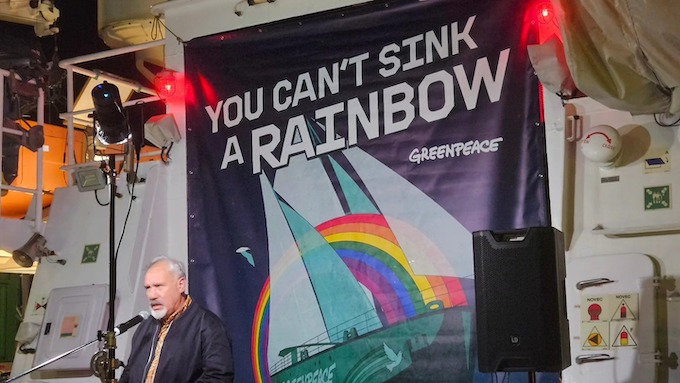
Teariki’s message to De Gaulle
In his address, Ena Manuireva started off by quoting the late Tahitian parliamentarian John Teariki who had courageously appealed to General Charles De Gaulle in 1966 after France had already tested three nuclear devices:
“No government has ever had the honesty or the cynical frankness to admit that its nuclear tests might be dangerous. No government has ever hesitated to make other peoples — preferably small, defenceless ones — bear the burden.”
“May you, Mr President, take back your troops, your bombs, and your planes.
“Then, later, our leukemia and cancer patients would not be able to accuse you of being the cause of their illness.
“Then, our future generations would not be able to blame you for the birth of monsters and deformed children.
“Then, you would give the world an example worthy of France . . .
“Then, Polynesia, united, would be proud and happy to be French, and, as in the early days of Free France, we would all once again become your best and most loyal friends.”
‘Emotional moment’
Manuireva said that 10 days earlier, he had been on board Rainbow Warrior III for the ceremony to mark the bombing in 1985 that cost the life of Fernando Pereira – “and the lives of a lot of Mā’ohi people”.
“It was a very emotional moment for me. It reminded me of my mother and father as I am a descendant of those on Mangareva atoll who were contaminated by those nuclear tests.
“My mum died of lung cancer and the doctors said that she was a ‘passive smoker’. My mum had not smoked for the last 65 years.
“French nuclear testing started on 2 July 1966 with Aldebaran and lasted 30 years.”
He spoke about how the military “top brass fled the island” when winds start blowing towards Mangareva. “Food was ready but they didn’t stay”.
“By the time I was born in December 1967 in Mangareva, France had already exploded 9 atmospheric nuclear tests on Moruroa and Fangataufa atolls, about 400km from Mangareva.”
France’s most powerful explosion was Canopus with 2.6 megatonnes in August 1968. It was a thermonuclear hydrogen bomb — 150 times more powerful than Hiroshima.
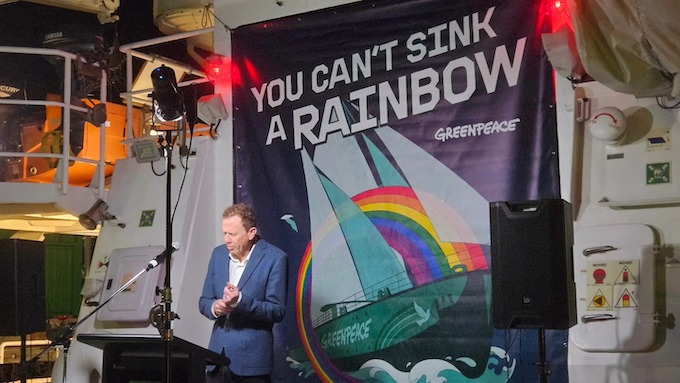
‘Poisoned gift’
Manuireva said that by France “gifting us the bomb”, Tahitians had been left “with all the ongoing consequences on the people’s health costs that the Ma’ohi Nui government is paying for”.
He described how the compensation programme was inadequate, lengthy and complicated.
Manuireva also spoke about the consequences for the environment. Both Moruroa and Fangataufa were condemned as “no go” zones and islanders had lost their lands forever.
He also noted that while France had gifted the former headquarters of the Atomic Energy Commission (CEP) as a “form of reconciliation” plans to turn it into a museum were thwarted because the building was “rife with asbestos”.
“It is a poisonous gift that will cost millions for the local government to fix.”
Greenpeace Aotearoa executive director Russel Norman spoke of the impact on the Greenpeace organisation of the French secret service bombing of their ship and also introduced the guest speakers and responded to their statements.
A Q and A session was also held to round off the stimulating evening.
